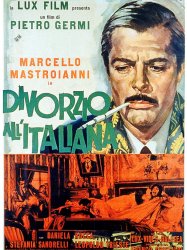Pietro Germi is a Actor, Director, Scriptwriter, Producer and Assistant Director Italien born on 14 september 1914 at Genoa (Italie)

Pietro Germi (14 September 1914, Genoa - 5 December 1974) was an Italian actor, screenwriter, and director. Germi was born in Genoa, Liguria, to a lower-middle-class family. He was a messenger and briefly attended nautical school before deciding on a career in acting.
He studied acting and directing at Rome's Centro Sperimentale di Cinematografia. During his time in school, Germi supported himself by working as an extra, bit actor, assistant director, and, on occasion, writer. Germi made his directorial debut in 1945 with the film Il testimone. His early work, this film included, were very much in the Italian Neorealist style; many were social dramas that dealt with contemporary issues pertaining to people of Sicilian heritage.
Through the years, Germi shifted away from social drama towards satirical comedies, but retained his loved element of the Sicilian people. In the 1960s, Germi received worldwide success with the films Divorce, Italian Style, Seduced and Abandoned, and The Birds, the Bees and the Italians. He was nominated for Academy Awards in both directing and writing for Divorce, Italian Style, and, subsequently, won in the writing category. He also won the Grand Prize at the Cannes Film Festival for The Birds, the Bees. His 1968 film Serafino won the Golden Prize at the 6th Moscow International Film Festival.
Germi collaborated on the scripts for all the films he directed and appeared as an actor in a few of them. He died in Rome of hepatitis on 5 December 1974.
Il accède à la renommée grâce à Divorce à l'italienne, une comédie de mœurs mariant satire et humour noir qui récolte trois nominations aux Oscars et obtient le trophée du meilleur scénario original. Le film de Germi est un des premiers exemples de la comédie à l'italienne telle qu'elle sera pratiquée notamment par Luigi Comencini et Dino Risi. Germi aussi poursuit dans la même veine en signant une série de comédies qui forment une peinture corrosive de la société italienne des années 1960 et 1970. (Séduite et abandonnée, Ces messieurs dames, etc.).
En 1972, Germi signe son dernier film Alfredo, Alfredo, une comédie mettant en vedette Dustin Hoffman et Stefania Sandrelli. Il meurt à l'âge de 60 ans, le 5 décembre 1974. Avant son décès, il avait écrit le scénario de Mes chers amis, avec l'intention de diriger lui-même le film. Voyant sa santé décliner, il confie son scénario à son ami Mario Monicelli, qui en signera la réalisation.
Source : Wikidata
Pietro Germi

- Infos
- Photos
- Best films
- Family
- Characters
- Awards
Nationality Italie
Birth 14 september 1914 at Genoa (Italie)
Death 5 december 1974 (at 60 years) at Rome (Italie)
Birth 14 september 1914 at Genoa (Italie)
Death 5 december 1974 (at 60 years) at Rome (Italie)
Pietro Germi (14 September 1914, Genoa - 5 December 1974) was an Italian actor, screenwriter, and director. Germi was born in Genoa, Liguria, to a lower-middle-class family. He was a messenger and briefly attended nautical school before deciding on a career in acting.
He studied acting and directing at Rome's Centro Sperimentale di Cinematografia. During his time in school, Germi supported himself by working as an extra, bit actor, assistant director, and, on occasion, writer. Germi made his directorial debut in 1945 with the film Il testimone. His early work, this film included, were very much in the Italian Neorealist style; many were social dramas that dealt with contemporary issues pertaining to people of Sicilian heritage.
Through the years, Germi shifted away from social drama towards satirical comedies, but retained his loved element of the Sicilian people. In the 1960s, Germi received worldwide success with the films Divorce, Italian Style, Seduced and Abandoned, and The Birds, the Bees and the Italians. He was nominated for Academy Awards in both directing and writing for Divorce, Italian Style, and, subsequently, won in the writing category. He also won the Grand Prize at the Cannes Film Festival for The Birds, the Bees. His 1968 film Serafino won the Golden Prize at the 6th Moscow International Film Festival.
Germi collaborated on the scripts for all the films he directed and appeared as an actor in a few of them. He died in Rome of hepatitis on 5 December 1974.
Biography
Élève du Centro Sperimentale di Cinematografia de Rome, Pietro Germi commence sa carrière comme assistant d'Alessandro Blasetti. Ses premiers films sont marqués par le néoréalisme. Ils sont notamment sensibles aux problèmes sociaux et économiques qui ébranlent l'Italie, de l'unification national au période d'après-guerre. La Tanière des brigands décrit le brigandage en Basilicate pendant le Risorgimento, Au nom de la loi évoque avec précaution la mafia en Sicile, Le Chemin de l'espérance la condition des mineurs siciliens et Le Disque rouge la vie des cheminots et l'alcoolisme dans le monde ouvrier. Germi quitte peu à peu le registre du mélodrame social pour aller vers une tonalité humoristique, grotesque et satirique. En tant qu'acteur, il campe un personnage remarquable d'inspecteur de police, tourmenté et scrupuleux, dans Meurtre à l'italienne, réalisé par lui-même en 1959, avec la toute jeune Claudia Cardinale.Il accède à la renommée grâce à Divorce à l'italienne, une comédie de mœurs mariant satire et humour noir qui récolte trois nominations aux Oscars et obtient le trophée du meilleur scénario original. Le film de Germi est un des premiers exemples de la comédie à l'italienne telle qu'elle sera pratiquée notamment par Luigi Comencini et Dino Risi. Germi aussi poursuit dans la même veine en signant une série de comédies qui forment une peinture corrosive de la société italienne des années 1960 et 1970. (Séduite et abandonnée, Ces messieurs dames, etc.).
En 1972, Germi signe son dernier film Alfredo, Alfredo, une comédie mettant en vedette Dustin Hoffman et Stefania Sandrelli. Il meurt à l'âge de 60 ans, le 5 décembre 1974. Avant son décès, il avait écrit le scénario de Mes chers amis, avec l'intention de diriger lui-même le film. Voyant sa santé décliner, il confie son scénario à son ami Mario Monicelli, qui en signera la réalisation.
Best films
Usually with
Filmography of Pietro Germi (34 films)
Actor
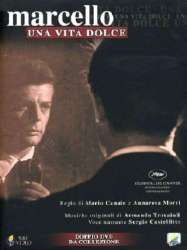
Marcello, una vita dolce (2006)
, 1h38Genres Documentary
Actors Marcello Mastroianni, Claudia Cardinale, Anouk Aimée, Sergio Castellitto, Ursula Andress, Lina Wertmüller
Roles Self (archive footage)
Rating68%





Une vie vécue avec douceur, ce doux regard et ce sourire narquois, cette légendaire paresse. Aujourd’hui encore, dire Mastroianni ou Marcello évoque une époque : un monde fait de bravoure, de beauté, de charme, de gentillesse. Au travers d’interviews de ses proches et de ses collaborateurs, d’extraits de films et d’images d’archives, ce documentaire narré par Sergio Castellitto veut raconter un homme qui a été le plus grand acteur italien et a vécu de façon extraordinaire avec le succès, en pensant souvent qu’il n’était peut-être qu’en train de rêver.

A Man Named John (1965)
, 1h30Directed by Ermanno Olmi
Origin Italie
Genres Drama, Biography, Historical
Actors Rod Steiger, Adolfo Celi, Romolo Valli, Pietro Germi
Roles Pontiff's Father
Rating10%





Le film raconte l'histoire et la vie du pape Jean XXIII Dans le rôle principal, Rod Steiger raconte la vie du pape.

Blood Feud (1961)
Directed by Damiano Damiani
Origin Italie
Genres Drama, Crime
Actors Belinda Lee, Sylva Koscina, Sergio Fantoni, Alberto Lupo, Pietro Germi, Andrea Checchi
Roles Bolognesi
Rating68%






The Lovemakers (1961)
, 1h46Directed by Mauro Bolognini
Origin Italie
Genres Drama
Actors Claudia Cardinale, Jean-Paul Belmondo, Pietro Germi, Gabriella Pallotta, Romolo Valli, Paul Frankeur
Roles Stefano
Rating68%





The original Italian is La Viaccia (the name of the family farm which motivates the plot). The death of a wealthy patriarch in 1885 sets off an interfamily power struggle. Son Ferdinando buys out his other relatives in order to gain full control over the dead man's property. But Ferdinando's country-bumpkin nephew Amerigo holds out. Amerigo's stance is weakened when he heads for the city and meets prostitute Bianca. To support her in the manner in which she is accustomed, Amerigo steals from his uncle. Disgraced in the eyes of his family, Amerigo decides to stay near his beloved Bianca by becoming a bouncer in her brothel.

Five Branded Women (1960)
, 1h55Directed by Martin Ritt, Bernard Vorhaus, Guido Guerrasio
Origin Italie
Genres Drama, War, Historical
Themes Political films, Films about capital punishment
Actors Silvana Mangano, Barbara Bel Geddes, Jeanne Moreau, Vera Miles, Carla Gravina, Van Heflin
Roles Partisan Commander
Rating65%





Yugoslav partisans grimly crop the hair of a village quintet of women believed to have consorted with the occupational Nazis. Four, for various reasons, have indeed - and their seducer is a lone, swaggering sergeant whom the partisans briskly emasculate. Escorted out of town by the sheepish Nazis, the forlorn ladies link up, patriotically and romantically, with a band of tough mountain guerrillas.

Lipstick (1960)
Directed by Damiano Damiani
Origin Italie
Genres Drama, Crime
Actors Pietro Germi, Giorgia Moll, Bella Darvi, Ivano Staccioli, Nino Marchetti, Renato Mambor
Roles Commissario Fioresi
Rating67%





Silvana, une adolescente de treize ans, porte à Gino, un proxénète, un amour sincère. Lorsqu'une prostituée est découverte assassinée dans leur immeuble, Silvana ne dit à personne qu'elle a vu Gino sortir de l'appartement de la victime. De son côté, Gino affirme à la police qu'il ne connaît pas cette fille.
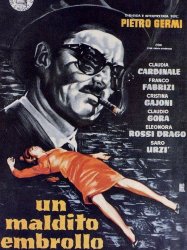
The Facts of Murder (1959)
, 1h55Directed by Pietro Germi
Origin Italie
Genres Drama, Crime
Themes Heist films
Actors Pietro Germi, Claudia Cardinale, Franco Fabrizi, Saro Urzì, Eleonora Rossi Drago, Cristina Gaioni
Roles Il Dott. Ingravallo
Rating73%





A disguised bandit steals valuable jewellery from Commendatore Anzaloni's apartment and flees, leaving Anzaloni unharmed. Inspector Ingravallo investigates and finds that the robbery is suspicious in that the robber was able to find valuables too quickly. A neighbour, Liliana Banducci, employs a servant girl, Assuntina. Her fiancé, Diomede, tries to escape when he sees police tailing Assuntina. But Diomede has an alibi. Liliana's cousin, Dr. Valdarena, pays her a visit, only to find her corpse on the floor. But before calling police, Valdarena removes an envelope addressed to him from the sideboard. Liliana's husband Remo was away from Rome at the time of the murder, but he is very surprised to hear that Liliana had changed her will only one week earlier.
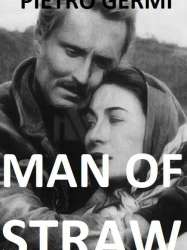
Man of Straw (1958)
, 2hDirected by Pietro Germi
Origin Italie
Genres Drama, Romance
Actors Pietro Germi, Franca Bettoja, Luisa Della Noce, Saro Urzì, Renato Montalbano, Mario Brega
Roles Andrea
Rating72%





Andrea, ouvrier spécialisé est un homme d'une quarantaine d'années, qui aime sa famille, composée de sa femme Luisa et d'un fils de huit ans, Giulio. Andrea reste seul à la maison car Giulio est malade et doit se soigner à la mer et Luisa l'accompagne. Il essaie de se distraire attendant le dimanche pour rejoindre sa famille. Andrea fait la connaissance de Rita qui le trouble et Luisa remarque le changement d'humeur de son mari lors de sa visite dominicale. À Rome, Andrea revoit Rita et les deux finissent par être submergés par la passion. Le retour soudain de Luisa et Giulio à la ville met fin à la relation. Andrea ressent un soulagement en reprenant la vie habituelle mais quand Rita apprend qu'Andrea a décidé de rompre la relation, elle se suicide. Sa mort bouleverse Andrea, déjà tourmenté par le remords de la trahison envers sa femme, et finit par lui avouer. Luisa ne supporte pas l'amère vérité et part avec le petit Giulio. Andrea se sent un homme fini et erre sans but, mais le soir du Nouvel An il retrouve à la maison sa femme et son enfant. Luisa a pardonné, mais le drame vécu laisse une marque indélébile dans leur vie.

The Railroad Man (1956)
, 1h58Directed by Pietro Germi
Origin Italie
Genres Drama, Romance
Themes Transport films, Rail transport films
Actors Saro Urzì, Pietro Germi, Sylva Koscina, Luisa Della Noce, Carlo Giuffrè, Riccardo Garrone
Roles Andrea Marcocci
Rating76%





Train operator Andrea Marcocci has to witness the suicide of a desperate man who jumps in front of his train. Under the influence of this shock he starts making mistakes. A check up by a doctor reveals that he's at the brink of becoming an alcoholic. Due to this evaluation he is degraded and must accept a salary cut.
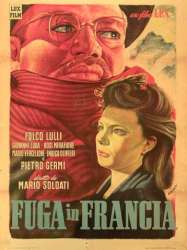
Escape to France (1948)
, 1h35Directed by Marino Girolami, Mario Soldati
Origin Italie
Genres Drama
Actors Folco Lulli, Pietro Germi, Mario Soldati
Roles Tembien
Rating71%





Le fasciste et ancien criminel de guerre Riccardo Torre essaye de quitter l'Italie et d'aller en France, mais est obligé de prendre avec lui son fils, car il craint que celui-ci devienne suspect aux yeux de la Police italienne.
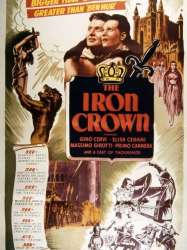
The Iron Crown (1941)
, 1h48Directed by Alessandro Blasetti
Origin Italie
Genres Fantasy, Adventure
Themes Films about magic and magicians
Actors Massimo Girotti, Gino Cervi, Elisa Cegani, Luisa Ferida, Rina Morelli, Marcello Mastroianni
Roles Cavaliere
Rating63%





Sedemondo (Gino Cervi) succeeds his brother Licinio (Massimo Girotti) upon his death as king of Kindaor, and a messenger bearing a crown made from a nail from the true cross requests permission to cross the kingdom. The crown by legend will stay wherever injustice and corruption prevail. Sedemondo takes it to a gorge where it is swallowed by the earth.

The Fornaretto of Venice (1939)
, 1h13Directed by Duilio Coletti
Genres Drama
Actors Elsa De Giorgi, Clara Calamai, Osvaldo Valenti, Enrico Glori, Carlo Tamberlani, Ermanno Roveri
Roles Frate domenicano
Director
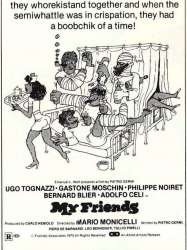
My Friends (1975)
, 2h20Directed by Pietro Germi, Mario Monicelli, Carlo Vanzina
Origin Italie
Genres Comedy, Comedy-drama
Actors Ugo Tognazzi, Gastone Moschin, Philippe Noiret, Adolfo Celi, Duilio Del Prete, Bernard Blier
Rating80%





Like in many other Monicelli movies, the main theme of Amici miei is friendship, seen from a rather bitter point of view. It tells the story of four middle-aged friends in Florence who organize together idle pranks (called zingarate, "gypsy shenanigans") in a continuous attempt to prolong childhood during their adult life.

Alfredo, Alfredo (1972)
, 1h50Directed by Pietro Germi
Genres Comedy, Romance
Actors Dustin Hoffman, Carla Gravina, Stefania Sandrelli, Saro Urzì, Clara Colosimo, Duilio Del Prete
Rating64%






A Pocketful of Chestnuts (1970)
, 1h48Directed by Pietro Germi
Origin Italie
Genres Comedy, Romance
Actors Gianni Morandi, Stefania Casini, Nicoletta Machiavelli, Franco Fabrizi, Gigi Reder, Memè Perlini
Rating59%





Luigi Vivarelli is a television director, a cynical and unrepentant womanizer. One day he meets Carla Lotito, an architecture student, and is immediately attracted to her. But Carla isn't like the other women that Luigi deals with - she's a Catholic who believes in the old and simple values that modern society deems unfashionable. Both try to convince the other of the rightness of their philosophy, and their basic disagreements put their love in jeopardy.
 Connection
Connection
